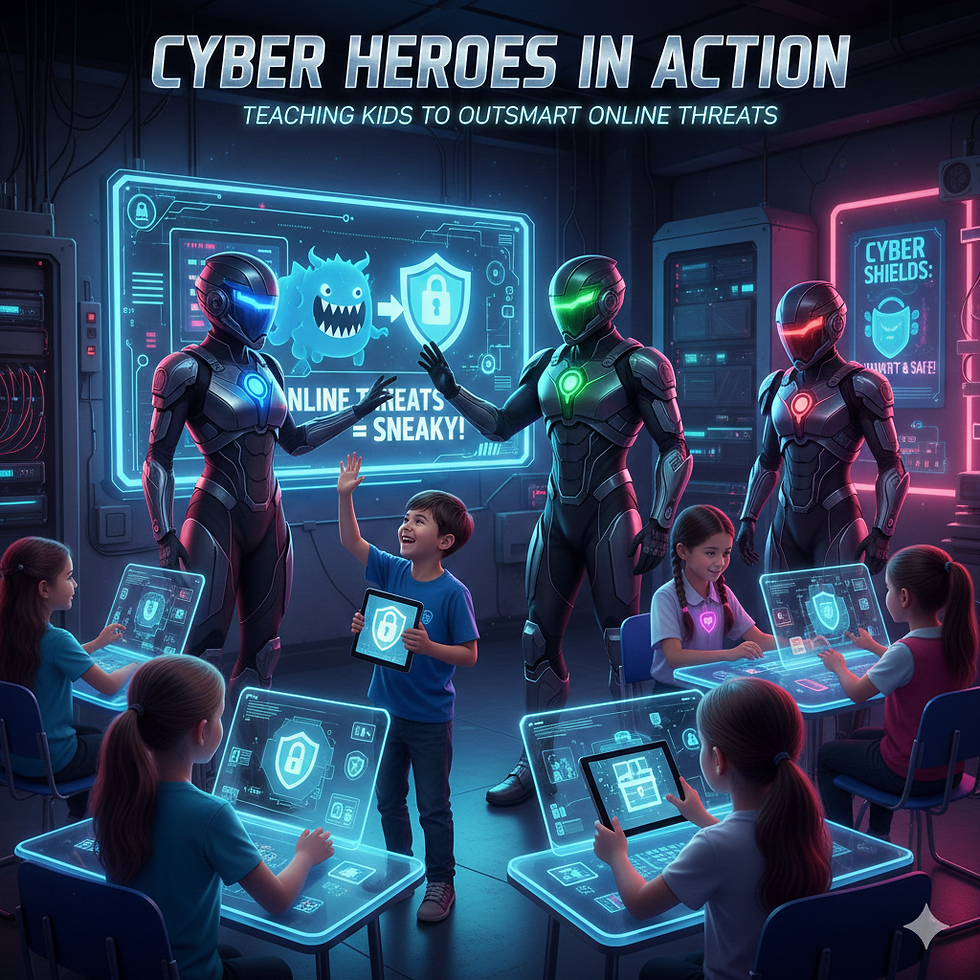Discover the Top 5 Cyber Threats Every Parent Should Arm Their Kids Against
- Valarian Couch
- Apr 11, 2025
- 3 min read
In today’s digital landscape, children are more connected than ever before. They interact with friends, play games, and explore a world that offers both exciting opportunities and serious risks. As parents, our role is to guide them through these experiences and teach them how to stay safe online. Raising awareness about potential dangers is essential to help children navigate these tricky waters. Here are five key cyber threats every parent should discuss with their kids, using relatable examples from the Cyber Heroes universe.
1. Phishing Scams
Phishing scams are a popular trick used by cybercriminals to steal personal information. These scams often come disguised as emails or messages that seem legitimate.
Picture a moment in Cyber Heroes where a character receives an attractive email claiming they’ve won exclusive in-game items. To claim the prize, they must enter their login details. This scenario vividly illustrates the lure of phishing scams and shows how easily children can be misled.
As a parent, encourage your kids to be skeptical of any unexpected messages. Teach them to check the sender’s email address carefully and always guide them to avoid clicking on links in dubious messages. For instance, according to a report from the Anti-Phishing Working Group, there were over 200,000 unique phishing attacks reported last year. This statistic highlights the importance of staying vigilant.
2. Cyberbullying
Cyberbullying occurs in various digital spaces, such as social media and online gaming. It involves harmful actions like spreading rumors or intimidating others.
Imagine a scenario where a Cyber Hero faces severe teasing from others in an online game. Initially, it might start as hurtful comments, but over time, it escalates into threats. This illustrates the emotional toll that such interactions can have on a person, extending beyond the screen.
Parents need to help their kids recognize the signs of cyberbullying. A recent survey found that nearly 36% of young people have experienced cyberbullying. Open communication is vital; assure your children that they can talk to you about any troubling online encounters. Reinforcing kindness and respect online can make a significant difference.
3. Inappropriate Content
The internet can expose children to content that is not suitable for their age, including explicit or violent materials. Without proper guidance, kids may accidentally stumble upon distressing images or videos.
Consider a young Cyber Hero who innocently explores a new online game but finds themselves in a dark area filled with inappropriate content. This scenario highlights how children can unintentionally encounter harmful material.
To combat this issue, parents should consider using parental controls on devices and apps. It’s also helpful to foster conversations about what types of content are inappropriate. According to a recent study, over 70% of children have encountered disturbing online content. By discussing these topics openly, kids will feel more empowered to navigate their online world responsibly.
4. Online Predators
Online predators often exploit the anonymity of the internet to groom children. They frequently pose as peers to gain trust before attempting to manipulate young users.
Imagine a Cyber Hero who befriends someone in their gaming community. Initially friendly, this person gradually makes inappropriate comments. This example serves as a cautionary tale about the hidden risks of online interactions.
Parents should inform their children about the dangers of chatting with strangers online. Encourage kids to ask for their parents’ permission before engaging in conversations that involve sharing personal information. Studies show that one in five kids has received unwanted sexual solicitations online. Keeping communication lines open will help children feel safe approaching you with concerns.
5. Identity Theft
Identity theft occurs when a person illegally uses someone else's personal information, often leading to financial loss. It’s critical for kids to learn how to protect their digital identities.
Imagine a plot in which a Cyber Hero gets their gaming account hacked because they shared their password with someone they just met online. This situation emphasizes how critical it is for children to safeguard their account details.
Teach your kids about creating strong, unique passwords and the importance of not sharing them, even with friends. Additionally, share that 42 million Americans reported identity theft last year. Explaining the significance of protecting personal information will empower kids to be cautious online.

By equipping children with knowledge about these five cyber threats—phishing scams, cyberbullying, inappropriate content, online predators, and identity theft—parents can help them navigate the online world with more confidence. Engaging with storylines like the Cyber Heroes universe provides a relatable framework that makes these lessons more impactful.
Encourage regular discussions about online safety and responsibility. These conversations can help foster a sense of security and empowerment, essential for young digital citizens. In a rapidly evolving digital world, proactive education is the key to keeping our children safe. With your guidance, they will be better prepared to face the challenges that lie ahead.

.jpg)




Comments